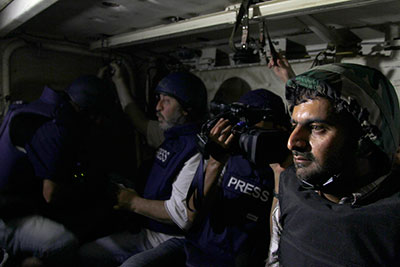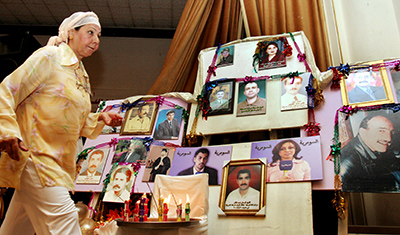Video: CPJ warns of impunity in Iraqi Kurdistan
On Tuesday, the Committee to Protect Journalists expressed its concerns over the press freedom climate in Iraqi Kurdistan at a press conference at the National Press Club in Washington, D.C. where we launched our special report, “Mountain of impunity looms over Kurdistan journalists.” You can watch a video of the press conference here.

Arab journalists need training for civil unrest and wars
In recent years, Arab journalists have been taking great risks to report important stories in a region where war and civil unrest remain an ever-present threat. Many are operating without proper equipment or safety training in how to recognize and mitigate the various risks they face.
Too many triggermen, too little justice in Iraq
The Iraqi city of Mosul is once again one of the world’s deadliest places for journalists. In the past two months, the capital of Nineveh province has witnessed a series of targeted assassinations that, according to local press freedom groups, have led to an exodus of journalists from the city fearing for their safety.
Training can help journalists survive captivity
Two murdered journalists for the Africa service of Radio France Internationale, Ghislaine Dupont, 51, and Claude Verlon, 58, might have had a chance. They were abducted on November 2 in Kidal in northern Mali, but the vehicle their captors were driving suddenly broke down, according to news reports.
Endless surprises for Al-Jazeera
Mhamed Krichen/CPJ Board memberThere seems to be no end to American surprises when it comes to Al-Jazeera. The latest was revealed by Der Spiegel, the German weekly news magazine, which reported the U.S. National Security Agency hacked into our internal communications system, according to documents provided by Edward Snowden, the former NSA security analyst.

Getting ready for contingencies in Afghanistan
Considering the worst-case scenarios for post-2014 Afghanistan, international news agencies should start planning a range of assistance responses for locally hired journalists and media staff. By the end of 2014, NATO troops will have largely withdrawn and the Karzai government will make way for a new administration. If the situation becomes chaotic, Afghans working for…

Iraq war and news media: A look inside the death toll
The U.S.-led war in Iraq claimed the lives of a record number of journalists and challenged some commonly held perceptions about the risks of covering conflict. Far more journalists, for example, were murdered in targeted killings in Iraq than died in combat-related circumstances. Here, on the 10th anniversary of the start of the war, is…

Combat deaths at a high, risks shift for journalists
Murder is the leading cause of work-related deaths among journalists worldwide–and this year was no exception. But the death toll in 2012 continued a recent shift in the nature of journalist fatalities worldwide. More journalists were killed in combat situations in 2012 than in any year since 1992, when CPJ began keeping detailed records.

Journalists still murdered where impunity reigns
Almost half of the 67 journalists killed worldwide in 2012 were targeted and murdered for their work, research by the Committee to Protect Journalists shows. The vast majority covered politics. Many also reported on war, human rights, and crime. In almost half of these cases, political groups are the suspected source of fire. There has…